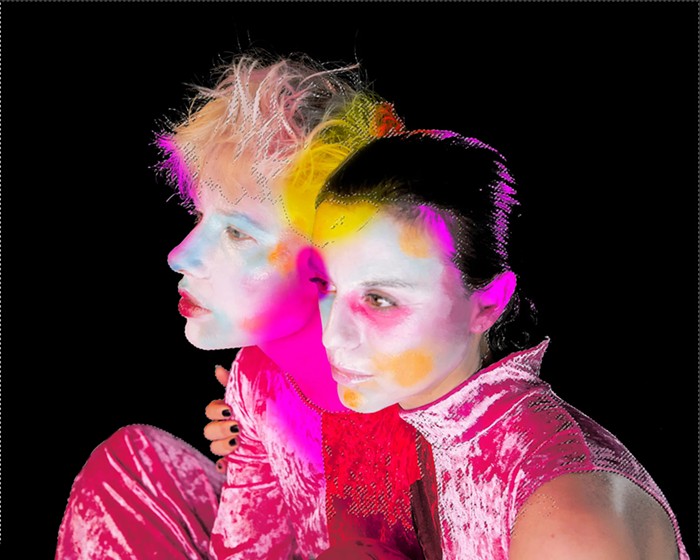Convenience is killing us. Plastic crap chokes the planet. Oceans are filling with oil. The climate is heating up. Ugh. Let's all just escape to the beach, shall we? Have another ice-cold bottled water. Put on a pop record. Welcome—Snoop Dogg is greeting you—to the world of Gorillaz' Plastic Beach.
You know Gorillaz, the cartoon concept band created by Blur frontman Damon Albarn and visual artist Jamie Hewlett. On paper (or video), the act is an animated foursome—Murdoc, the satanist bassist and bandleader; 2-D, his empty-headed and much-abused mouthpiece; Russel, the drummer possessed by ghosts of dead rappers; and Noodle, the mail-order Japanese guitar prodigy. In the studio, it's Albarn plus a revolving assemblage of high-profile collaborators—Dan the Automator and Del the Funkee Homosapien on 2001's Gorillaz, Dennis Hopper and MF Doom on follow-up Demon Days, Bobby Womack and Little Dragon on the new album.
The cartoon plot behind the album is that the band got into some trouble back on the mainland—involving cyborgs and gigantism—and had to flee to a man-made island/floating fortress built out of discarded junk: the Plastic Beach. If this doesn't bring to mind the great garbage patch/plastic gyre in the Pacific, then you're just not worrying enough about the slow end of the world.
Previous Gorillaz albums have evoked vague moods—often a deadpan gallows humor—but Plastic Beach coheres around a clear theme. The album plays with concern for the environmental (and mental) damage done by capitalism's endless appetites, the commercially stoked desire for convenience, and our willingness to accept cheap substitutes instead of the real thing. (The irony of this message being delivered by a "fake," prefab band—one whose multimedia branding machinery would make Naomi Klein despair—has likely not escaped anyone involved.) Paradoxically, the worse things get, the more we might crave instant gratification and escape, damn the consequences.
This all sounds like a massive drag, the stuff of an Adbusters or Greenpeace screed, but Albarn and company make it perfectly breezy and frequently as funny as you'd expect from a band of comic-book characters. Snoop Dogg's introduction, "Welcome to the World of the Plastic Beach," begins by flipping Gil Scott-Heron's script to inform us, with a touch of instructive sarcasm, that in fact, "the revolution will be televised"—sit back, relax, everything's going to be fine. "Superfast Jellyfish" is an advert for a line of processed breakfasts ("Ready in only three microwave minutes") with a gamely Saturday morning'd De La Soul talking up the product's supposed virtues ("Pretty packages of frosty delights," "It comes with a toy—I like that," "It tastes just like chicken"). "Some Kind of Nature" has an audibly aged Lou Reed over a buoyant keyboard melody, doing his louche "Walk on the Wild Side" proto-rapping about "phony clothes" and "some kind of plastic I could wrap around you."
Occasionally, the mood is less comic and more like a happily resigned ambivalence, a mood that Albarn is terribly adept at striking. "Rhinestone Eyes" builds from sleepy, weepy verses to a queasily upbeat, sample-inflected chorus, mixing up romantic longing with worry about "factories far away." The album's sweetest, catchiest song ("On Melancholy Hill") begins with Albarn singing: "Up on melancholy hill/There's a plastic tree/Are you here with me?" It's a fine line on its own, but it also reads like a wink at the exhausting self-seriousness of such globally concerned bands as Radiohead, with their "Fake Plastic Trees."
This is the great trick that Plastic Beach pulls off: It's never a great time when bands get serious and make a BIG, MEANINGFUL ALBUM. (For all the good work they might do, it's hard to even hear U2 anymore.) But Gorillaz succeed in dialing up the real-world concern while still being fun and clever—in short, you know, cartoons. You can take a deep reading of the album, unpacking every other lyrical couplet for clues and cues, or you can just skim the surface and enjoy the band's ever-refined hybrids of hiphop and synth pop. Either way, Plastic Beach makes for a great, unsustainable escape. ![]()


















